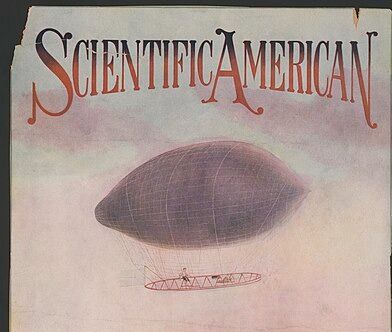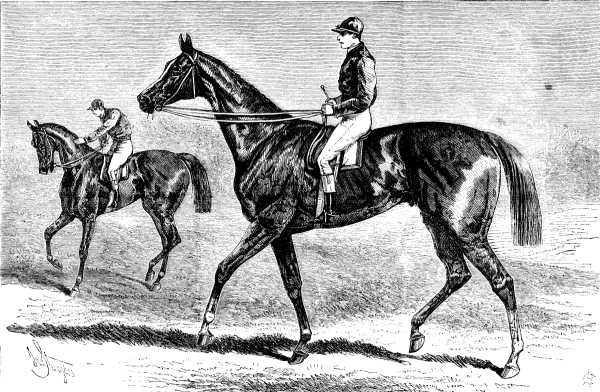Scientific American Supplement, No. 392, July 7, 1883 by Various, is part of the HackerNoon Books Series. You can jump to any chapter in this book here. ST. BLAISE, THE WINNER OF THE DERBY.
ST. BLAISE, THE WINNER OF THE DERBY.
St. Blaise, the property of Sir Frederick Johnstone, was bred by Lord Alington, and is by Hermit from Fusee. This is an unexceptionable pedigree, for Hermit is now as successful and fashionable a sire as was even Stockwell in his palmiest days, while Fusee was far more than an average performer on the turf, and won several Queen's Plates and other races over a distance of ground. St. Blaise is by no means a big colt, standing considerably under sixteen hands. His color is about his worst point, as he is a light, washy chestnut, with a bald face and three white heels. He has a good head and neck, and very powerful back and muscular quarters, added to which his legs and feet are well shaped and thoroughly sound. His first appearance was made in the Twenty-fourth Stockbridge Biennial at the Bibury Club Meeting, when he won easily enough; but there were only four moderate animals behind him. A walk-over for the Troy Stakes followed, and then Macheath beat him easily enough for the Hurstbourne Stakes, though he finished in front of Adriana and Tyndrum. For the Molecomb Stakes at Goodwood, he ran a dead-heat with Elzevir, to whom he was giving 7 lb.; and Bonny Jean, in receipt of 10 lb., was unplaced. A 7 lb. penalty seemed to put him completely out of the Dewhurst Plate; but he must then have been out of form, as, on the following day, it took him all his time to defeat Pebble by a neck in the Troy Stakes. This season he has only run twice. His fourth in the Two Thousand was by no means a bad performance, considering that he was palpably backward; and his victory of last week is too recent to need further allusion. Porter, his trainer, can boast of several other successes in the great race at Epsom; but Charles Wood had never previously ridden a Derby winner. St. Blaise was unfortunately omitted from the entries for the St. Leger, but has several valuable engagements at Ascot next week, and appears to have the Grand Prize of Paris, on Sunday, at his mercy.--Illustrated London News.
[NATURE.]
SCIENTIFIC PROGRESS IN CHINA AND JAPAN.
Various steps in the progress of China, and Japan in the adoption of Western science and educational methods have from time to time been noticed in these columns. To the popular mind the names of the two countries are synonymous with rigid, unreasoning conservatism and with rapid change, respectively. The grave, dignified Chinese, who maintains his own dress and habits even when isolated among strangers, and whose motto appears to be, Stare super mas antiquas, is popularly believed to be animated by a sullen, obstinate hostility toward any introduction from the West, however plain its value may be; while his gayer and more mercurial neighbor, the Japanese, is regarded as the true child of the old age of the West, following assiduously in its parent's footsteps, and pursuing obediently the path marked out by European experience. There is considerable misconception in this, as indeed there is at all times in the English popular mind with regard to strange peoples. Broadly speaking, it is no doubt correct to say that, Japan has adopted Western inventions and scientific appliances with avidity; that she has shown a desire for change which is abnormal, and a disposition to destroy her charts and sail away into unsurveyed seas, while China remains pretty much where she always was. She is now, with some exceptions, what she was twenty, two hundred, perhaps two thousand years ago, while a new Japan has been created in fifteen years. All this, we say, is true, but it is not the whole truth. China also has had her changes; not indeed so marked or rapid, not so much in the nature of a volte-face on all her past as those of her neighbor.
The radical difference between the two countries in this respect we take to be this: that while Japan loves change for the sake of change, China dislikes it, and will only adopt it when it is clearly demonstrated to her that change is absolutely necessary. To the Japanese change appears to be a delightful excitement, to the Chinese a distasteful necessity; to the former whatever is must be wrong, to the latter whatever is is right. As a consequence of this difference between the two peoples, when China once makes a step forward it is generally after much deliberation, and is never retraced. Japan is constantly undertaking new schemes with little care or thought for the morrow, but with the applause of injudicious foreign friends. In a short time she discovers that she has underrated the expense or exaggerated the results, and her projects are straightway abandoned as rapidly and thoughtlessly as they were commenced. Swift suggested as a suitable subject for a philosophical writer a history of human projects which were never carried out; the historian of modern Japan finds these at every turn. Where, for example, are the results of the great surveys, trigonometrical and others, which were commenced in Yezo and the main island about ten years ago? A large, expensive, but highly competent foreign staff was engaged, and worked for a few years; but suddenly the whole survey department was swept away, and the valuable instruments are, or were recently, lying rusting in a warehouse in Tokio. The same story may be told of scores of other scientific or educational undertakings in Japan. An able and careful writer, Col. H.S. Palmer, R.E., who has recently, with a friendly and sympathetic eye, examined the whole field of recent Japanese progress, in the British Quarterly Review is forced to acknowledge this. "Once having recognized," says this officer, "that progress is essential to welfare, and having resolved, first among the nations of the East, to throw off past traditions and mould their civilization after that of Western countries, it was not in the nature of the lively and impulsive Japanese to advance along the path of reform with the calmness and circumspection that might have been possible to a people of less active temperament. Without doubt many foreign institutions were at first adopted rather too hastily, and the passing difficulties which now beset Japan are to some extent the inevitable result." It would be blindness to deny that the net result of the Japanese efforts is progress of a very remarkable kind, but it is a progress which in many respects lacks the firm and abiding characteristics of Chinese movements.
The proverb, Chi va piano va sano, which was recommended ten years ago to Japanese attention by an eminent English official, and apparently disregarded by them, has been adopted by their continental neighbors. To the blandishments of pushing diplomatists or acute promoters, the Chinese are deaf. However we may felicitate ourselves on our inventions, scientific appliances, "the railway and the steamship and the thoughts that shake mankind," our progress, the newspapers, the penny post, and what not, China will not adopt them simply because we have found their value and are proud of them. But if, within the range of her own experience, she finds the advantage of these things, she will employ them with a rapidity and decision surpassing those of the Japanese. A conspicuous instance of this will be found in her recent action with respect to telegraphs. For years the Chinese steadily refused to have anything to do with them; the small land line which connected the foreign community of Shanghai with the outer world, was maintained against the violent protests of the local authorities, and the cable companies experienced some difficulty in getting permission to land their cables. But during the winter of 1870-80, when war with Russia was threatened, the value of telegraphs was demonstrated to the Peking government. The Peiho at Tientsin was closed by ice against steamers, and news could only be carried to the capital by overland couriers from Shanghai. Before a year elapsed a land line of telegraph was being constructed between this port and Tientsin; in a few months the line was in working order, and the Chinese metropolis is now in telegraphic communication with every capital in Europe.
This conservatism, respect for antiquity, conceit, prejudice, call it what we will, has something in it that extorts our respect. Let us imagine a dignified and cultivated Chinese official conversing with a pushing Manchester or Birmingham manufacturer, who descants on the benefits of our modern inventions. He would probably commune with himself in this wise, whatever reply Oriental politeness would dictate to his interviewer: "China has got on very well for some tens of centuries without the curious things of which this foreigner speaks; she has produced in this time statesmen, poets, philosophers, soldiers; her people appear to have had their share of affliction, but not more than those of Europe; why should we now turn round at the bidding of a handful of strangers who know little of us or our country, and make violent changes in our life and habits? A railway in a province will throw thousands of coolies and boatmen out of employment and bring on them misery and starvation. This foreigner says that railways and telegraphs have been found beneficial in his country; good, let his countrymen have them if they please, but let us rest as we are for the present. Moreover, past events have not given us such faith in Europeans that we should take all they say for wisdom and justice." A day will undoubtedly come when China also will have her great mechanical and scientific enterprises; but what we contend for here is that nothing we can say or do will bring that time an hour nearer. European public opinion is to China a dead letter; she refuses to plead before that tribunal. Each step of her advance along our path must be the result of her own reflection and experience; and our wisest policy would be to leave her to herself to advance on it as she deems best. SINENSIS.
About HackerNoon Book Series: We bring you the most important technical, scientific, and insightful public domain books.
This book is part of the public domain. Various (2005). Scientific American Supplement, No. 392, July 7, 1883. Urbana, Illinois: Project Gutenberg. Retrieved https://www.gutenberg.org/cache/epub/8742/pg8742-images.html
This eBook is for the use of anyone anywhere at no cost and with almost no restrictions whatsoever. You may copy it, give it away or re-use it under the terms of the Project Gutenberg License included with this eBook or online at www.gutenberg.org, located at https://www.gutenberg.org/policy/license.html.


